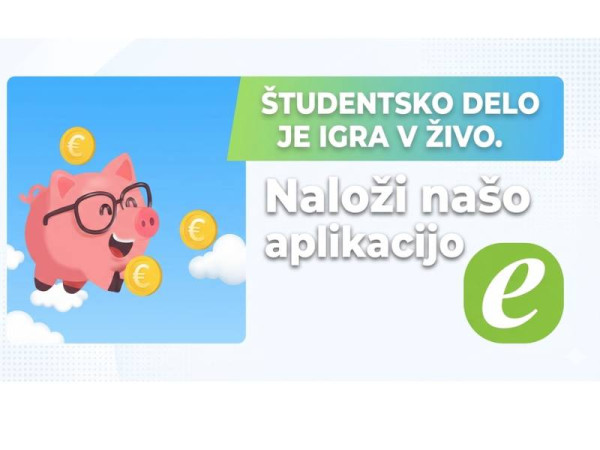
Basic information for international students
Fill the form and become a member of the e-Student Service
You need to send the following documents to the Financial Administration of the Republic of Slovenia (FURS):
-
KIDO 12 form and specification of amounts (we will send you a pre-filled one once you receive payment; just let us know by e-mail that you need it.)
-
Proof of education (school or university)
-
Proof of tax residency from your home country (obtained in your country);
-
If you are over 26 years old, attach a certificate of first enrollment in studies.
Submit these documents to the Financial Administration of the Republic of Slovenia (FURS) or use the eTaxes app.
▶️ Instructions for using eTaxes and registration.
📣 Using the app will help you complete your application faster.
✅ Using the eDavki app will speed up the process.
Once approved, FURS will return the tax advance to your bank account, usually within one month, up to the amount of the special personal allowance for that calendar year.
TIP: If you are a non-resident and plan to stay in Slovenia for a longer period, you can arrange your Slovenian resident status. More information.
Special personal allowance:
For 2025 - amount: 3.682 €
Who is eligible? Students
Age limit: Up to 26 years old.
It also applies to students older than 26, if they enrolled in studies no later than the year they turned 26, and for undergraduate studies, the allowance is valid for up to six years from the date of enrollment. For postgraduate studies, the allowance is valid for up to four years from the date of enrollment.
Standardized expenses:
- 10 % of the student's gross earnings.
- These are expenses that do not need to be proven.
- For income from student work, this is an automatic allowance granted in any case (even if the conditions for the special allowance are not met).
Pension and disability insurance contribution:
- 13.95 % of the student's gross earnings.
- The difference between gross and net earnings means that a 13.95 % contribution is deducted from the payment for pension and disability insurance (PDI), as student work counts toward the pension period.
- Until January 31, 2024, the contribution for PDI was 15.5 %. From February 1, 2024, it is reduced by 10 % and now amounts to 13.95 %.
Employment contract: Working through a student job agency is not employment under an employment contract, so you are not obligated to sign such a contract.
Before starting work, the employer cannot require you to sign a document that would:
- oblige you to respect a non-compete clause,
- waive certain rights in advance,
- agree in advance that the employer may reduce your pay in the event of an accident for which you are not responsible,
- agree in advance that the employer may unilaterally reduce your hourly rate if you do not meet the expected results,
- waive payment in advance under certain conditions.
If the nature of the work is such that, as a student, you handle various documents containing sensitive and strictly personal data, you are obliged to sign a declaration on the protection of such data, in accordance with the General Data Protection Regulation (GDPR).
A preliminary medical examination is required for students working based on student referrals if:
- The safety statement indicates specific health requirements for the job,
- The risk assessment identifies hazards like accidents or occupational diseases, or
- The examination is mandated by special regulations.
- For low-risk jobs, a standard medical certificate from a student health checkup is sufficient, valid for up to five years.
- If specific risks are identified, the employer must arrange a full examination with a certified occupational health specialist.
Before the beginning of work, agree very precisely on all the work conditions with the employer:
- Payment (payment for work, introduction, calculation of stimulus work, missing inventory...);
- Duration of work;
- Requirements, additional conditions, and internal rules at the employer;
- The period within which you can expect the payment;
- It is also important that the employer provides you, before you start working, with a signed and validated copy of the referral.
- It is also important that the employer validates the referral at the beginning of work. This means that the employer signs one copy of the referral or signs it electronically.
It is also important that the employer validates the referral at the beginning of work. This means that the employer signs one copy of the referral or signs it electronically.
At the student service you can find out how regularly your potential employer makes payments. Before you start working, you can check the website www.neplacniki.info to see whether this employer is on the list of employers who do not pay for student work.
Reimbursement for lunch and transportation costs for students is not legally mandated.
It is recommended to arrange this with the company before starting work.
The lunch break is included in working hours and must be paid, but students typically cover the cost of their own meals, as employers are not required to provide lunch.
In practice, larger companies often have organized meal services.
During daily work, a student working full-time (8 hours) is entitled to a 30-minute break.
A student working part-time but at least 4 hours a day is entitled to a proportional break based on time worked.
Break time can only be taken after one hour of work and at least one hour before the end of the workday. The break is counted as part of the working time and is paid.
It is recommended to have mandatory health insurance in accordance with the legislation of the Republic of Slovenia and EU regulations, as medical expenses can arise in case of injury.
For arranging mandatory health insurance, contact the Health Insurance Institute of Slovenia (ZZZS).
No, the referral is only valid for work in Slovenia.
The legislation does not mandate reimbursement for students' expenses, such as mileage or daily allowances. Only the minimum hourly rate is legally defined, while reimbursement of other expenses is a matter of agreement between the student and the company.
In case of disagreement, you can contact the e-Student Service. We will mediate between you and the company.
-
In the case that the company does not pay the invoice, we will do out best to ensure that you receive the agreed payment. You can track the entire recovery process.
-
If you believe that an employer does not comply with the agreement, made before the commencement of work or violates your rights, you can contact us and explain the circumstances of the dispute or violation. We will contact the employer and warn him about his obligations.
- Full-time work should not exceed 40 hours per week.
- Overtime can be up to 8 hours per week, 20 hours per month, and 170 hours per year.
- A workday can last up to 10 hours.
- Due to the nature or organization of work, working hours can be unevenly distributed but should not exceed 56 hours per week during such periods.
- The rule in Article 146 prohibiting work beyond full-time also applies in cases of uneven distribution or rescheduling of working hours.
Yes, training must be paid.
Every hour that a student spends in the company, even if it’s just for introductory information and supervised work, must be paid.
Training can be paid at a lower hourly rate, but not less than the minimum hourly wage.
Training new workers is a crucial part of any work process.
- Reimbursement for meals and transportation for students is not legally mandated.
- It is recommended to negotiate this with the company before starting work.
- Larger companies often have organized meal services.
- The break for a meal is counted as work time and must be paid, but students usually cover the meal costs themselves.
- Reimbursement for transportation costs is subject to agreement.
- Students may claim transportation costs when filing their tax returns to reduce the taxable base.
The Employment Relationships Act specifies that an employee (in this case, a student) who intentionally or through gross negligence causes damage to the employer is obligated to compensate for it.
The Employment Relationships Act states that employees under 18 years old are not allowed to work at night between 10:00 p.m. and 6:00 a.m. In specific fields like culture, arts, sports, and advertising, the restriction is between 12:00 a.m. and 4:00 a.m.
These restrictions do not apply to students who are over 18.
Yes. Mandatory health insurance (OOZ) for students is regulated by Article 22 of the Health Care and Health Insurance Act (ZZVZZ), which also applies to the mandatory health contribution (OZP).
When you turn 26 in a calendar year and your student status expires, you need to arrange health insurance.
Example: If you turn 26 on May 1, your student status is valid until September 30, so you must arrange your health insurance by that date.
For more details, contact ZZZS for information on mandatory health insurance and contributions.
Kako podaljšam status?
Piši nam na [email protected] ali pokliči na najbližjo poslovalnico.
Obvestila za dijake in študente




